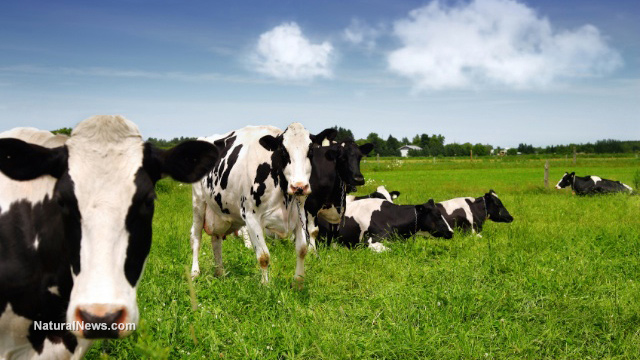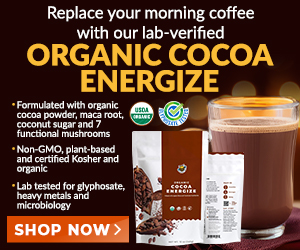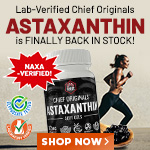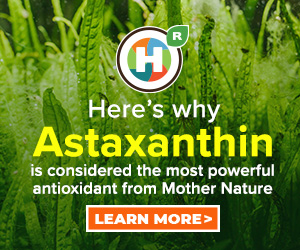Why grass-fed meat is better for your health and the environment
Saturday, September 06, 2014 by: Michelle Goldstein
Tags: grass-fed meat, environment, food production

- European Court of Justice: Healthcare professionals who promoted or administered COVID-19 vaccines are CRIMINALLY LIABLE for any harm caused
- “Old Man in a Chair”: The COVID-19 pandemic was a carefully orchestrated scheme for global control
- Cinnamon plays a critical role in diabetes management
- FRAUD ALERT: Details DEMOCRATS do NOT want you to know about the $40 BILLION wasted on Fed-loaded credit cards cancelled by DOGE
- Scientists unveil breakthrough method to eliminate "Forever Chemicals" from water, transforming waste into graphene
- Newly released JFK files reveal Pentagon's role in creating Lyme disease and covid in the same lab
- Postcard from 1875 highlights smallpox vaccine’s failure: Lessons for today’s COVID-19 response
- Massive egg substitution recall: Bleach contamination sparks nationwide concern
- DOGE finds evidence of Social Security fraud and illegal immigrant voter registration
- AI-powered forecasting model proves more accurate than traditional systems at predicting the weather
- Oncologist warns of ‘terrifyingly aggressive’ cancers in children, linked to immune suppression from COVID vaccines
- Preparing for the unthinkable with William Brocius’ “How to Survive the Death of the Dollar”
- Zelensky defies Trump, rejects U.S. aid repayment and mineral deal amid rising tensions
- World Health Organization in crisis, prepares for DOWNSIZING after U.S. withdrawal and funding problems
- Trump administration deploys spy satellites to enhance southern border surveillance
- Science proves PASSION FRUIT is a powerful medicine for the GUT and the HEART
- Pentagon memo suggests U.S. will not defend Europe from Russian aggression, prioritizing China and homeland security
- When antibiotics are unavailable, natural ANTIMICROBIAL compounds become essential first line defenses against infection
- Newly released JFK files reveal Pentagon's role in creating Lyme disease and covid in the same lab
- Kiss Your Genetic Privacy Good-Bye! 23andMe Gets Green Light to Sell Your Intimate Genetic Details to Anyone They Want
- Oncologist warns of ‘terrifyingly aggressive’ cancers in children, linked to immune suppression from COVID vaccines
- Analysis: The coming economic collapse, a mass uprising and Trump's three secret weapons to halt the growing revolt
- European Court of Justice: Healthcare professionals who promoted or administered COVID-19 vaccines are CRIMINALLY LIABLE for any harm caused
- Dr. Suzanne Humphries makes bombshell appearance on Joe Rogan podcast, exposing vaccine industry deception back to POLIOMYELITIS
- Woman contracts WORLD'S DEADLIEST VIRUS after unknowingly being given the WRONG VACCINE
- NIH study, buried for decades, reveals that Flu Shots INCREASE elderly deaths, not prevent them
- Sugar-free deception: Artificial sweeteners hijack hunger signals, fuel obesity epidemic, study warns
- CDC finally halts $11 billion COVID funding scam as health officials admit the ‘pandemic’ was a fraud
- AI weather model outperforms traditional forecasts, boosts accuracy by 20%
- Black cumin seed oil emerges as a powerful ally against breast cancer and chronic inflammation
- Musk targets “strangely wealthy” lawmakers in DOGE probe, names Pelosi, McConnell, Schumer
- COVID-19 scandal linked to CANCER SURGE: Billionaire researcher sounds alarm
- “Independent” anti-Russia outlet MEDUZA faces COLLAPSE as US funding dries up
- The Health Ranger releases “Vaccine Zombie” song and music video, using AI-animated zombies for the music video
- DARPA: The shadowy innovator behind the world’s most advanced military technologies
- Britain’s descent into police state censorship: Parents raided for questioning their daughter’s school system online
- Newly released JFK files reveal Pentagon's role in creating Lyme disease and covid in the same lab
- California's social media censorship law struck down: A victory for free speech or a threat to online safety?
- EPA advisor admits the agency is funneling billions to climate groups ahead of Trump’s return to White House
- The Health Ranger releases “Vaccine Zombie” song and music video, using AI-animated zombies for the music video
- Dr. Mike Yeadon releases 15-minute testimony - WATCH - about genocidal intent of COVID “vaccines”
- Florida takes a stand: DeSantis proposes permanent ban on mRNA vaccine mandates
- Mike Adams releases country western hit single: Goin’ Back in Time is Comin’ Home
- Rep. Nancy Mace introduces bill to ban biological males from female facilities on federal property
- Unpacking the Lies That We’ve Been Fed – new song and music video released by Mike Adams, the Health Ranger
- “Why we influenced the 2020 elections”: Facebook files reveal the coordinated effort to bury the Hunter Biden laptop story
- House Intelligence Committee calls for the ARREST and PROSECUTION of Dr. Anthony Fauci
- Sugarcane extract superior to cholesterol-lowering drugs?
- The pandemic as a tool for INDOCTRINATION: Understanding “The Indoctrinated Brain” by Dr. Michael Nehls
- Survival 101: Effective EMF blocking techniques
- Mike Adams releases music poetry sensation: A Child of God
- Peter Rost exposes Big Pharma corruption in his book “The Whistleblower: Confessions of a Healthcare Hitman”
- Migrants are taking advantage of recent hurricanes to scam residents and loot their homes
- Michigan sheriff announces criminal investigation into 2020 election crimes, Dominion Voting Systems
- Red Cross issues warning to stop blood plasma donations from vaccinated people
- Scientists confirm: GENIUS brain function can be spontaneously unleashed in humans without any apparent cause
- EPA advisor admits the agency is funneling billions to climate groups ahead of Trump’s return to White House
- HYSSOP: What research reveals about the health benefits of this ancient holy herb
- Two containers with completed ballots fall out of truck in Florida
- Fully vaccinated about to see “tsunami” of illness and death, warns virologist
- Global leaders unite to clamp down on “misinformation” with UN-backed Cascais Declaration
- BREAKING: 2025 NDAA authorizes mandatory military draft of WOMEN across America… as Pentagon pursues global NUCLEAR war with both Russia and China at the same time
- Michael Yon warns of a ZIONIST TAKEOVER in Trump’s second administration
- Ozempic and Wegovy weight loss drugs are injectable LIZARD VENOM PEPTIDES that may unleash a devastating wave of organ failure… side effects align with symptoms of SNAKE BITES
- BOMBSHELL: DNA testing kits are a SCAM to develop ethnic-specific bioweapons
- Israeli soldiers accused of even more torture and abuse in the West Bank
- These 13 countries just signed an agreement to engineer a global FAMINE by destroying food supply
- NASA admits that climate change occurs because of changes in Earth’s solar orbit, and NOT because of SUVs and fossil fuels
- Newly released JFK files reveal Pentagon's role in creating Lyme disease and covid in the same lab
- RFK Jr. clears key hurdle: Sen. Susan Collins backs controversial HHS nominee, signaling a new era for health policy
- Sermon 30: How Jesus reveals Caesar’s FAKE CURRENCY and FALSE AUTHORITY
- Coriander seeds: Ancient medicine backed by modern science
With industrialization and factory farms, this has changed. Animals are confined in small quarters, never seeing the light of day and fed harmful waste and byproducts, along with growth hormones and antibiotics. Meat from conventionally raised animals lack the many nutrients found in grass-fed or "pastured" meats.
"Happy" cows and chickens
Pastured meat comes from chicken and cows allowed to live outdoors, enjoying sunshine and their natural diet of grass, plants and insects. Because pastured animals are given their natural diets, they remain healthy and only infrequently require antibiotics to treat infections. Chickens are often protected from predators by living outside during the day in large, movable pens, allowing them to graze freely on grass.
This is a stark contrast to conventionally raised animals, confined to crowded, unethical living conditions. These animals are often fed chicken feces, sawdust, cheap candy and genetically modified grains. Growth hormones and antibiotics are given routinely.
Health benefits of grass fed meats
The fat profiles from 100% grass-fed animals are similar to that of salmon. Pastured meats have the following health benefits:
- Higher in beta-carotene
- Higher vitamin E levels
- Improved ratio of omega 6 to omega 3 ratio
- Higher in total omega 3
- Higher in B vitamins thiamin (B1) and riboflavin (B2)
- Increased amounts of minerals, calcium, magnesium and potassium
- Higher amounts of conjugated linoleic acid
- Increased levels of vaccenic acid
A California State University study found that pasture-fed steers contained seven times the amount of beta-carotene compared to grain-fed animals. Beta-carotenes are precursors of vitamin A, an essential fat-soluble vitamin important for bone growth, reproduction, vision and immune function.
Vitamin E levels are four times higher in grass-fed cows than in conventionally raised cattle. Vitamin E is linked to lower risks of heart disease and cancer.
B1 and B2 vitamins help support the body's energy, nerves, muscles and heart function. The minerals calcium, magnesium and potassium help maintain strong bones while supporting nerves, muscles and blood circulation. Potassium is essential for proper electrolyte balance and lowers the risk for high blood pressure.
Most Americans have an imbalance of omega-3 to omega-6 fats. Grass-fed meats help balance this with its higher omega-3 content. Omega-3 fats are critical for heart health and prevention of cancer and autoimmune disorders.
Conjugated linoleic acid can reduce cancer, high blood pressure, cardiovascular disease, osteoporosis and insulin resistance.
Vaccenic acid is an important trans fat that occurs naturally in ruminant animals. A study published in the Journal of Nutrition discovered that vaccenic acid protects against atherosclerosis, a known risk factor for heart disease. Vaccenic acid is NOT the same as dangerous, synthetically produced trans fats found in most processed vegetable oils.
Pastured chicken meat is also healthier than conventionally raised chickens. Pastured chickens have been found to have higher levels of vitamin A and omega-3 fats.
Benefits of small farms
The small farm continues to be a perfect ecosystem, with cow manure used to fertilize crops and vegetables grown on the farm. By contrast, cow manure and chemicals from factory farms contaminate streams and destroy the environment.
Conclusions
When choosing what meat to purchase, consider grass-fed meat, which benefits the health of people, animals and the planet.
Sources for this article include:
http://www.growandbehold.com
http://www.kolfoods.com
Food, Inc. Dir. Robert Kenner. 2008.
http://www.naturalnews.com
http://dailyhealthpost.com
http://www.care2.com
About the author:
Michelle is a mental health therapist who incorporates holistic approaches into her counseling practice. She has 25 years of experience successfully counseling individuals, couples and families.
Michelle became passionate about holistic health, healing and politics, after immersing herself into the world of alternative medicine looking for answers to a family member's health crisis. Beginning in 2008, Michelle learned that many standard health care recommendations, which she had long trusted, actually contribute to causing disease.
Michelle's health articles can be found at the following sites:
http://holistichealthtogo.com/
http://www.michellegoldsteinmsw.com/
https://twitter.com/holistictogo
https://www.facebook.com/goldsteinhealth
Grass-fed meat at FETCH.news
Get independent news alerts on natural cures, food lab tests, cannabis medicine, science, robotics, drones, privacy and more.
Take Action: Support Natural News by linking to this article from your website
Permalink to this article:
Embed article link: (copy HTML code below):
Reprinting this article:
Non-commercial use OK, cite NaturalNews.com with clickable link.
Follow Natural News on Facebook, Twitter, Google Plus, and Pinterest
Science News & Studies
Medicine News and Information
Food News & Studies
Health News & Studies
Herbs News & Information
Pollution News & Studies
Cancer News & Studies
Climate News & Studies
Survival News & Information
Gear News & Information
News covering technology, stocks, hackers, and more



"Big Tech and mainstream media are constantly trying to silence the independent voices that dare to bring you the truth about toxic food ingredients, dangerous medications and the failed, fraudulent science of the profit-driven medical establishment.
Email is one of the best ways to make sure you stay informed, without the censorship of the tech giants (Google, Apple, Facebook, Twitter, YouTube, etc.). Stay informed and you'll even likely learn information that may help save your own life."
–The Health Ranger, Mike Adams












































